-
PERFECT NANNY/CHANSON DOUCE (Lucie Borleteau 2019)
LUCIE BORLETEAU: PERFECT NANNY/CHANSON DOUCE (2019)
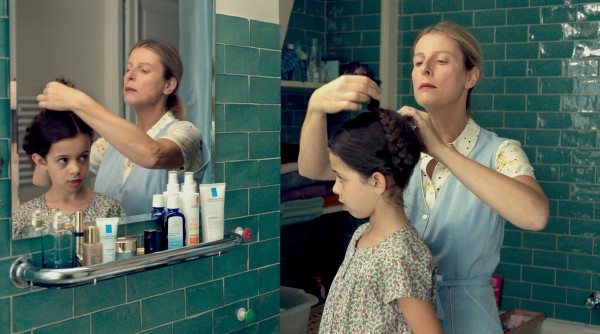
KARIN VIARD IN CHANSON DOUCE
Servant trouble and story trouble
The English title "Perfect Nanny" is deeply ironic (the original French title means "Lullaby"): this is a bad nanny thriller, a slow-burn horror story adapted from Leïla Slimani's recent Goncourt Prize bestseller, which takes off from an Upper East Side news story but which a Washington Post critic described as worthy of the elegance and complexity of Henry James's Turn of the Screw. In the original news item a nanny fatally stabbed her two children charges and then cut her own throat and that's where the novel begins. French filmmaker Lucie Borleteau saves that for the end, and rather bungles it. Peter Bradshaw calls this film "strained and unsatisfying" and notes that it "pulls its punches with the final grisly scene."
In the event, this new French film adaption isn't as the French would say à la hauteur, quite up to the standard of its novelistic source. The trouble is the nanny from hell idea is in itself unoriginal, and there's a danger of falling into cliché if one can't achieve the delicacy of details or elegance of style of the novel source. Karin Viard is well cast as Louise, the nanny the young couple; she is the best thing about this movie. The glossy mise-en-scène is pleasing, but it can't hide a lack of originality in the storytelling in which the finer novelistic details are insufficiently highlighted. The portrait of the psycho is neither scary enough nor coherent enough and the choppy editing fails to generate suspense. For that is substituted nervousness about how clumsily the ending will be handled.
As the story begins, Myriam (Leïla Bekhti, wife of Tahar Rahim), who trained as a lawyer, and is tired of being at home tending a toddler and young daughter, Mila. So she and her husband Paul, (Antoine Reinartz, the strained history prof of R-V 20202's School Life) a record producer, interview prospects - leading to a standard audition montage showing Louise is the one since she's white, slim, well-spoken, French, and smiles. Her references are impeccable too ( details of those might have been interesting). She takes to the children and they to her before the interview's even over.
When Louise starts work things go well. Myriam gets back deep, perhaps too deep, back into her legal work. She and Paul enjoy their increased freedom, signaled (rather obviously) by their attending a wild party. Louise seems to be doing a great job. She goes out of her way, coming early and leaving late for her commute. It's soon clear Louise's desire to lose herself into caring for the kids is unhealthy, perhaps arising from the need to escape from an unpleasant past. She is also watching what Myriam and Paul do and disapproving. She wants to control. She becomes more and more possessive about the children, and while Miriam defends her apparent oddities, Paul is increasingly dissatisfied. All the time Louise is being reminded that even though she is welcomed and even invited along on a vacation, she is not in control, that however the two children like her she doesn't matter. And that she cannot bear.
This kind of story is a thing of little details. Louise and Myriam clash over consuming past-expiration date yogurt: Louise hates, nay, is infuriated by wasted food. Her bosses are spoiled bourgeois, while she shows signs of earlier poverty that persists today. When extra times for Louise with Mila and Adam get cancelled, Louise is upset. Her involvement is out of proportion. Eventually she does strange and disgusting things, before the horrible one.
The film dips in and out of Louise's point of view, and toward the end a scene of imaginary sea creatures shows she is unhinged. However, the film's handling of POV isn't very consistent. The point of several visits to Louise's humble home in the 'burbs is unclear.
The finale is anticlimactic. Borleteau shows smoothness and competence here, but not a master's hand.
Lucie Borleteau's first feature was Fidelio: Alice’s Odyssey (Rendez-Vous 2015) a seagoing sex tale that was somewhat inexplicable but also original. She goes more mainstream here, with mixed success.
Perfect Nanny/Chanson douce, 100 mins. debuted Oct. 3, 2019 in Montpelier and Paris. Its French theatrical release was 27 Nov.,with an AlloCiné press rating 3.2 (64%). In the US, it is a Distrib Films release.
Rendez-Vous with French Cinema:
Monday, March 9, 6:15pm (Q&A with Lucie Borleteau cancelled due to the Coronavirus)
Wednesday, March 11, 1:45pm
Last edited by Chris Knipp; 03-11-2020 at 09:19 PM.
-
CUTIES /MIGNONNES (Maimouna Doucouré 2020)
MAMOUNA DOUCOURÉ: CUTIES/MIGNONNES (2020)
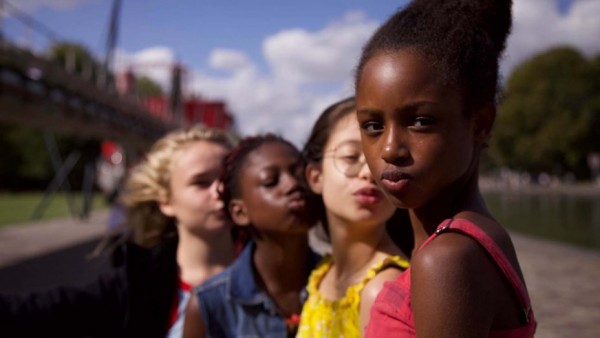
FATIHA YOUSSOUF ABDILLAH (FAR RIGHT) IN MIGNONNES
A girl beyond her age
A few years ago the young Mamouna Doucouré was a biology student and actress. She made some notable short films, and now she has made her first feature, the portrait of Amy (Fathia Youssouf), an 11-year-old girl in Paris of Senegalese origin wavering between rebellion and cultural tradition. She gets really wild, dresses in a costume to perform in her girl group "Mignonnes" ("Cuties") in a way family adults would consider shocking and sluttish. Pivotal to the story is how these young girls don't quite understand how sexualized their tight outfits and their butt-pumping in their dance is making them. As the film ends, disenchanted with the efforts at fitting in and the dance competition, Amy comes home and is last seen jumping rope, like a young schoolgirl.
As a portrait of vibrant multicultural young females in the banlieue, this movie obviously relates to and may draw from Céline Sciamma's ghetto-girls feature Bande de filles (vaguely retitled "Girlhood" in English). The difference is the focus here on pressure from ethnic elders. Thanks to the cinematography of Yann Maritaud, the people often look great. But for all its energy, color, and good direction of kids and non-actor adults, Cuties isn't on the level of Sciamma. Sometimes Mignonnes is as approximate as the performances of the girls' hiphop group and as uneven as the group's mismatched makeup. Best aspect of the film isn't the stuff about the group, but the rumblings of complicated family trouble. Amy's father plans on bringing a second wife into the home, with all the humiliation for her mother and derangement of household order that this impending event - which is colorfully depicted toward the end - will bring.
Amy meets her new best friend, the bespectacled Anjelica (Médina El Aidi-Azouni), when the latter spots her dancing in the laundry room and is intrigued. The eventual result is that the shy, skinny Amy is, if somewhat uneasily, allowed - thanks to her choreographical skills - to join up with the dance group Anjelica is in called "Les Mignonnes" or the Cuties, who are already (not always plausibly) preparing for a competition. The movie heads toward the conventional structural device of the climactic competition with last minute reversals that change the dynamics of the group.
In Cuties Doucouré has accessed and presented on screen a vibrant ethnic community not often seen in French films. Hopefully she will make future films that deserve more than onscreen click-time via Netrlix.
Cuties/Mignonnes, 96 mins., debuted at both Sundance and Berlin in early 2020. It was also included in the Rendez-Vous with French Cinema at Lincoln Center, where it was screened for this review. In the US it is a Netflix release. French theatrical release is scheduled for Apr. 1 2020.
Rendez-Vous with French Cinema:
Tuesday, March 10, 6:30pm (Q&A was to have been with Maïmouna Doucouré, cancelled)
Thursday, March 12, 2:00pm
Last edited by Chris Knipp; 08-21-2020 at 02:38 PM.
-
AN EASY GIRL/UNE FILLE FACILE (Rebecca Zlotowski 2019)
REBECCA ZLOTOWSKI: AN EASY GIRL/UNE FILLE FACILE (2019)
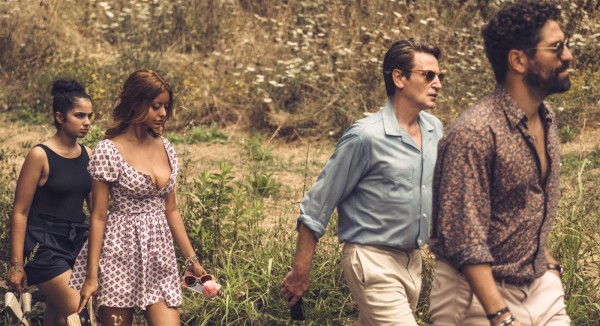
MINA FARID, ZAHIA DEHAR, BENOÎT MAGIMEL AND NUNO LOPEZ IN UNE FILLE FACILE
An easy hour and a half
Rebecca Zlotkowski's third feature, Planetarium, the one before this, was in Rendez-Vous 2017 but it was not shown to the press and I didn't review it. One should probably see her 2016 Planetariaum, cowritten by Robin Campillo of Eastern Boys and BPM. Her 2013 Grand Central was in the 2014 Rendez-Vous and attracted interest because it featured Tahar Rahim, the young breakout star of Jacques Audiard'sA Prophet, and Léa Seydoux of so many things. I don't know enough about Zlotkowski's work to provide context, but both her earlier and the new film have two hot young actors (though this time not famous ones like Rahim and Seydoux), and a well-known older actor - then, Olivier Gourmet, this time, Benoît Magimel. A minor character is Naima's gay pal Dodo (Lakdhar Dridi) who she's preparing an acting audition with that she neglects for this moment with rich and glamorous people.
Magimel is admirably mellow and smooth here. One other thing that's clear is Zlotkowski is interested in class and sex. Here, there are two attractive young women of no particular status who briefly are taken up by two abundantly rich, leisured, and privileged men, Brazilian art collectors, we are told, on a millionaire's yacht in the Cannes harbor who can afford to offer them baubles worth a thousand euros merely for being friendly and staying on board overnight.
This film seems slight as Grand Central, and even more richly sensuous. The setting is lush, the genre traditional: a night of love instead of a summer of love, and a summer of growing up - for the voiceover narrator, 16-year-old (she looks older, but never mind) Naima (Mina Farid), a naive Cannes local. In the wisp of a plot, She's visited by a more sophisticated cousin, Sophia (Zahia Dehar), who has a fling with the younger of the two yacht millionaires, the bearded Andres (Nuno Lopes), while Naima has a chaste evening of mentoring from the older Philippe (Magimel). Next day they are taken on the yacht to visit a rich women friend (Clotilde Courau) in Italy. Then the yacht guys go on another outing, and the girls are not invited. Naima is hurt, but Sophia takes it in stride. She understands the details of status evidently better. Later, Sophia ends her visit with Naima, and the story ends.
Why did I enjoy this flimsy stuff? Because of something very traditional, the sensuousness of Brigitte Bardot movies, or No Sun in Venice (and Rohmerr too), the coming of age angle, the sense of luxury (this film is partly about this beautiful yacht, not a billionaire's yacht, like the one in "Succession," but a sleeker, maybe even more elegant one), and the lush sound track.
Zahia Dehar doesn't seem quite like an actress, and isn't. She's herself a notorious former high level call girl, an "escort," she called herself, from Algeria, who became "a model, lingerie designer and actress," says an IMDb bio. It also reports that in April 2010 there was a scandal called "the Zahia case," of French footballers accused of having sex with Zahia when she was underage. Well, Sophia is presented as being more sophisticated than Naima, but not like that! One has the feeling that to some extent this film was created for Zahia, if riskily since in the event Zahia seems not just sophisticated but the worse for wear. It was better not to know about this backstory before watching the film. But Zlotowski views Sophia non-judgmentally, allowing Naima to admire her Mediterranean freedom. LIke Bardot she is something of the eternal feminine, a spirit above conventional morality. In the title's phrase, "Easy Girl," there is an intentional ambiguity, an admiration for Sophia's freedom, but awareness it looks like impropriety from a distance.
But anyway, the story is also basically Naima's, with her voiceover, and the emotional core is her developed bond, not of love but of respect, for and from Phlippe. In the writing, the mentoring relationship between Phhilipe and Naima may not be wholly believable, but Maginel is such a smooth, confident actor he very nearly makes it work and provides the tiniest of touching moments, modeling a man who behaves respectfully toward a young woman.
An Easy Girl/Une fille facile, 92 mins., debuted at Cannes in Directors Fortnight; its French release was Aug. 28., with an AlloCine press rating of 3.5. (70%). Reviewed here as part of the Rendez-Vous with French Cinema. A Netflix release.
Rendez-Vouswith French Cinema:
Saturday, March 7, 9:00pm (Q&A with Rebecca Zlotowski)
Thursday, March 12, 4:00pm
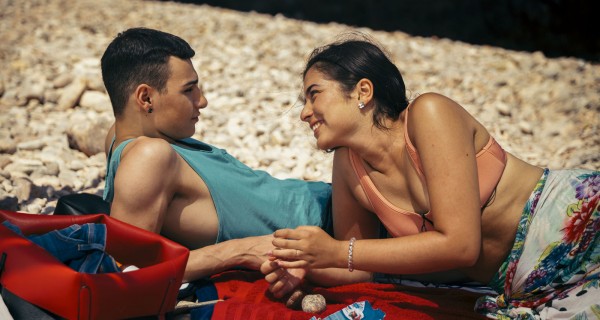
LAKDHAR DRIDI AND MINA FARIDI IN AN EASY GIRL
Last edited by Chris Knipp; 03-14-2020 at 06:54 PM.
-
JOAN OF ARC/JEANNE (Bruno Dumont 2019)
BRUNO DUMONT: JOAN OF ARC/JEANNE (2019)
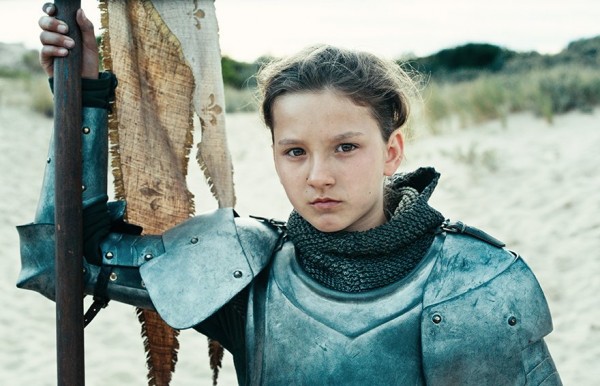
LISE LEPLAT PRUDHOMME IN JEANNE
Numbing history
I have followed Bruno Dumont faithfully for many years, even when he's made dramatic shifts of direction with his comic "Quinquin" series and the grotesque "Slack Bay" film, and even the nutty rock-rap fantasy (staged on the sand dunes along a northern sea) about the young Joan of Arc. But with his full-on sequel to that oddball riff on the sainted Joan's early years, Jeannette, entitled Jeanne, he has run off the rails too far and I cannot follow. (Both this and the previous film are inspired by plays by Charles Péguy.)
This would be a funny film if it weren't so boring. Mind you, I am full of admiration for the young actress Lise Leplat Prodhomme, who plays the peasant girl inspired by holy voices to lead French armies for King Charles successfully against his rivals and the English, but who, after her victorious operations faltered, was tried for heresy and burned at the stake. Leplat Prodhomme has presence, and speaks always with plenty of conviction. Her passionate commitment to her role is unquestionable, her confidence, her simple, inner faith. When the camera looks her in the eye, she stares right back. It's as intense a gaze as you'll ever see in a film. She could become an actress, with such presence. The trouble is that, especially in the taxing opening sequences, she sometimes seems to be mechanically reciting her lines, looking into space. Nonetheless at the end she seems to embody the role.
But there's a worse problem. The fifteenth-century Jeanne d'Arc was young. But records tell us she was nineteen. Lise is only ten years old now. She's not only too young, but looks too small to lead an army.
More than half this over-long film is devoted to the trial of Joan of Arc, and it's a disaster. As Nick James points out in his BFI review this trial was one of the most fascinating court cases in history: it absorbed "Villon, Voltaire, Southey, Schiller, Coleridge, Thérèse of Lisieux, Mark Twain, Shaw, Brecht (three times), Anouilh and many others." It's been the subject of film classics by Carl Theodor Dreyer, Robert Bresson, Victor Flemiing (with Ingrid Bergman), Otto Preminger (Jean Seberg's shaky start), as well as Rossellini, Paul Verhoeven, Jacques Rivette, Luc Besson and many others. Bruno Dumont has reduced it to a lengthy and tedious procedural, explaining all the little details, minus any drama other than Joan's stubborn and monotonous determination not to reveal what her voices have told her.
The actors are often buffoonish, but without being funny as in a "Monty Python" episode, which the action here otherwise often resembles. Instead of laughing we pinch ourselves to stay awake and ask how much longer this self-conscious silliness is going to go on. The answer is way, way too long.
Dumont persists in using pairs of odd looking, mismatched men with speech defects. Dolled up in flowing outfits from Central Costumes Rental, in velvet robes and dangling gold medals and cozy cloth caps, a duo of these overdressed, slightly off-key non-actors enthusiastically mumble or jaw their complicated lines listing all the celebrity clerics arriving for the trial. One is tall, and his whole face jiggles when he talks. His interlocutor is short and goofy. This is a bad beginning for the trial sequence that should be so momentous.
As the trial begins, Prodhomme's childlike conviction impresses. But as the proceedings unfold seemingly in real time, they become tedious.
The production, despite crystal-clear cinematography by David Chambille, doesn't compensate for these failings. Shooting the early scenes in the dunes again, where Dumont filmed a lot of his 2016 TV miniseries "Li'l Quinquin" and his four features since then, becomes absurd when Jeanne and various men must stumble through the sand in full armor. The prison Jeanne is held in is a World War II seaside bunker, providing a crude contrast to the grand setting of the trial, which is filmed in Amiens Cathedral in lieu of Rouen, where it actually took place.
The cathedral setting looks beautiful. But it rings false for anyone paying attention, because Amiens is full of glorious gilded baroque decor dating from at least two hundred years later than 1431, the year of the trial. We could overlook such incongruities if this were an interesting script and these were convincing actors, but such is not the case.
The interruption of lip-synched musical numbers composed by the French Seventies rocker Christophe, once famous for his melodic high-pitched ballads, does nothing but slow down the torpid action and render it more absurd.
This whole experience reminded me of my childhood, when my family lived in Williamsburg, Virginia and we attended the historical pageant put on there, with local participants, depicting the history of the early colonies, when Williamsburg was the capital. It was called "The Common Glory," and it went on interminably, with all those amateur actors dutifully reciting their lines.
Jeanne, 137 mins., debuted May 2019 at Cannes in Un Certain Regard, and it was included in at least seven other festivals. The French theatrical release was 11 Sept. 2019. The Paris critics liked it (AlloCiné press rating 3.9 or 78%) - but the AlloCiné spectators poll is 2.2 or 44%, showing a thoroughly unhappy French public. Included in the March 2020 Rendez-Vous with French Cinema in New York (co-sponsored by UniFrance and Film at Lincoln Center), for which it was meant to be reviewed for Filmleaf. But the series was cancelled midway due to the coronavirus pandemic, and this was one of the seven films I had yet to see when that happened. It is now being released in digital and on-demand, currently offered by Film at Lincoln Center (sponsors of the Rendez-Vous) on Festival Scope, whereby it was screened for this review. The Anglophone critics have disliked it even more than the AlloCiné spectators: the Metascore is 23%.
Last edited by Chris Knipp; 04-15-2020 at 09:24 AM.
-
ISADORA'S CHILIDREN/LES ENFANTS D'ISADORA (Damien Manivel 2019)
DAMIEN MANIVEL: ISADORA'S CHILDREN/LES ENFANTS D'ISADORA (2019)
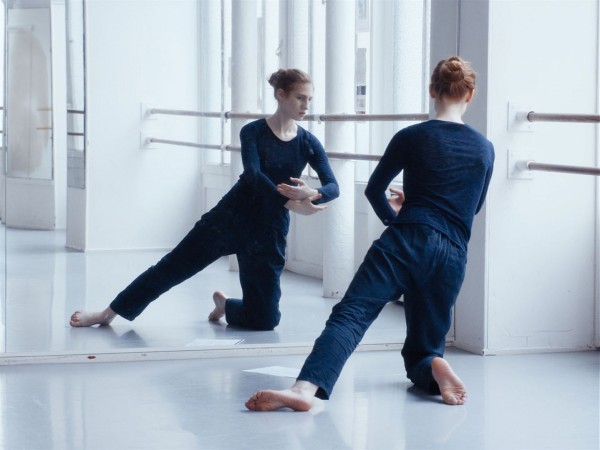
AGATHE BONITZER IN LES ENFANTS D'ISADORA
The preparation and witnessing of a dance fraught with tragic emotion
The modern dance pioneer Isadora Duncan (1877-1927), though her performance life was brief, was an immense cultural figure in France and America and beyond in the early twentieth century. In 1913 she lost her two young children, Deirdre Beatrice, seven, and Patrick Augustus, three, in a tragic accident when they were with their nanny and a runaway car submerged in the Seine and they drowned. Isadora was devastated, and for a time could barely move. After several weeks in Corfu with here two siblings and in Viareggio with the equally immense and controversial Eleanora Duse, Isadora's artistic response (but not till eight years later, in 1921) was to create "Mother," a dance expressing her feelings about the loss of her children. She composed the dance in Russia, where she had gone to live after the Revolution, to the music of Scriabin's Etude Op.2 No. 1 (played here by jérome Petit). Isadora's Children/Les enfants d'Isadora recreates the staging of this dance at the present time, over a hundred years later, from multiple viewpoints.
This film's segmented action focuses on four women, a fledgling choreographer (Agathe Bonitzer) who learns of the dance from Duncan's memoir and searches it out in Laban's dance notation (seeing that in a film is a first in my experience); an Italian dance teacher and choreographer (Marika Rizzi)), who works together with a young student with Down's Syndrome, (Manon Carpentie); and a venerable member of the audience (seventy-one-year-old dancer and choreographer Elsa Wolliaston), herself a parent who has lost a child, but also a great figure of contemporary dance now long in retirement, who sees the dance performed and takes it home with her, deeply moved, to perform a few of its eloquent gestures in her room.
The first part focuses on Bonitzer, an alabaster redhead with prominent nose, always alone (though there is another body in her bed at night), assiduously studying the Laban notation, practicing the dance through October and November in an immaculate dance studio, first with only street sounds, then to Scriabin's solo piano. She makes notes. "Bercer une dernière fois" (cradle one last time), and in the dance, she is cradling empty space. The mood is contemplative and peaceful. Children playing and a parent with a child are glimpsed.
The dance is to be performed, a program shown us tells, at the Carré Magique in the town of Lannion, in Brittany, Wednesday, November 28, 2018. The next thirty minutes, though, consist of Rizzi teaching Manon, in the practice part of the hall. We learn that Rizzi herself has a son and daughter, both away in high school and beyond in other countries, and she misses them. The lessons seem elementary, and we get only that Manon says she is more relaxed in front of an audience, and Rizzi gets frustrated and lectures her that she must go slower and identify much more intensely with the feeling of the dance. "Cradle one last time." Manon listens to the Scriabin with headphones traveling home on a train.
This is rather a disappointment after the contemplative intro from Bonitzer, which leads us to expect something more exciting, surely, than these sketchy instructions, this sensitive but limited student. But Rizzi is a patient teacher, and Manivel is a patient observer. This only works if we slow. Way. Down. The best moment shows Manon performing alone, and we can absorb the Scriabin and its sublime melancholy - Chopin meets Rachmaninoff.
Then the performance, which we don't see: instead we look at faces in the audience - a good passage, again teaching us calm and contemplation. The last face is that of the only black lady we see, Elsa Wolliaston, with tears running down her cheeks. When it is over she leaves, walking with a cane, sometimes with considerable difficulty. Here is another dancer, then, like the late Merce Cunningham, doomed to end life hobbling. The last eighteen minutes are devoted to Elsa, Jamaican-American dancer, actor, and cultural figure, resident in France, and influential, from 1969, a figure in African dance developed in Europe in the Seventies. These minutes are drenched in pathos, and they are slow.
Some of the French critics were themselves quite moved by the film. But Arthur Champilou of aVoir-aLire.com believed its blurring of the line between documentary and fiction doesn't work, because "the line between the two is too thin this time" and "the spectator does not know with which eye to look at it." Moreover, he argues, the director "doesn't manage to develop a real plot around his subject," and does not "deal with issues other than those specific to the artist in the middle of his work." "Les Enfants d'Isadora is an unclassifiable film... in the wrong sense of the word." Mathis Badin in Cahiers du Cinéma, as quoted on AlloCiné, simply says that "A certain explanatory heaviness - at times carried to the limits of tautology - dissipates the strangeness that has been the charm of the filmmaker's previous work."
In extenuation one may mention that Damien Manivel is himself a dancer. He was overwhelmed by the dance, its dramatic origins, and the living response to it, and could not be bothered to make a conventional film, either documentary or fictional. Jean-Christophe Ferrari may best describe what Manivel is doing, in ideal terms, when he says his aim is to make us feel "how a body, little by little, allows itself to be affected by the story it is charged with telling."
Manivel simultaneously touches on dance, through this one dance, from multiple angles - learning, mastery, performance, witness, and memory - and many viewers (and reviewers) have noticed how the film dwells on little disparate details, and is composed of them.
A minor, but still worthy, addition to the cinematic literature of dance, and modern dance in particular. But Isadora's Children will be simply much to slow for many viewers.
Isadora's Children/Les enfants d'Isadora, 84 mins., debuted at Locarno in Aug. 2019, where director Damien Manivel won the best directdor award, and showed in five other festivals. The French theatrical release Nov. 20, 2019, with an AlloCiné press rating of 3.6 (72%). It was also included in the March 2020 Rendez-Vous with French Cinema in New York (co-sponsored by UniFrance and Film at Lincoln Center), for which it was meant to be reviewed for Filmleaf. But the series was cancelled before it was over due to the coronavirus pandemic, and this was one of the seven films I had yet to see when that happened. It is now being released in digital and on-demand through its distributor Shellac, currently offered by Film at Lincoln Center on Festival Scope, whereby it was screened for this review.
Last edited by Chris Knipp; 04-15-2020 at 10:19 AM.
-
THE SPECIALS/HORS NORMES (Olivier Nakache, Éric Toledano 2019)
OLIVIER NAKACHE, ÉRIC TOLEDANO: THE SPECIALS/HORS NORMES (2019)
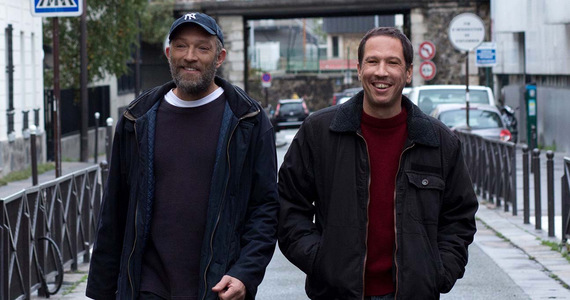
VINCENT CASSEL AND REDA KABTEB IN HORS NORMES
114m
French with English subtitles
U.S. Premiere
This heartfelt comic drama from the directing duo behind The Intouchables (Rendez-Vous 2012) targets structural neglect in the French medical system. Bruno (Vincent Cassel) runs a shelter for autistic young people turned away by hospitals, while his friend Malik (Reda Kateb) mentors underprivileged youths seeking employment. Both men, based on real-life people, are constantly frustrated by the lack of consistent funding and institutional support—which eventually leads them to confront the government head-on. With help from a spirited ensemble, The Specials—the 2019 Cannes Film Festival’s closing night selection—crackles with fiery commitment as Bruno and Malik advocate for those living on the margins.
French release 23 Oct., AlloCiné press raging 3.9 (78%)
Saturday, March 14, 4:00pm
Sunday, March 15, 8:45pm
Last edited by Chris Knipp; 03-09-2020 at 09:44 AM.
-
SOMEONE, SOMEWHERE/DEUX MOI (Cédric Klapisch 2029)
CÉDRIC KLAPISCH: SOMEONE, SOMEWHERE/DEUX MOI (2019)
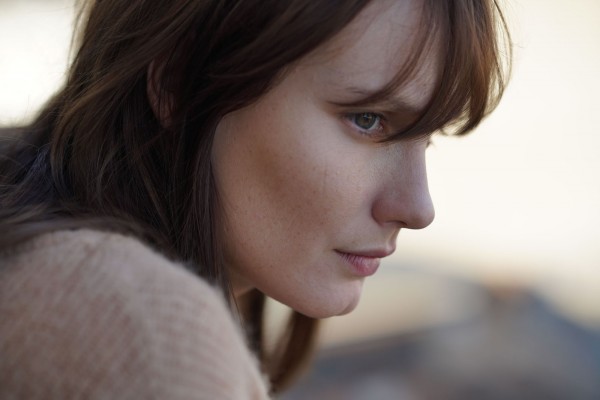
ANA GIRARDOT IN DEUX MOI
Depression meets rom-com in Klapisch's Paris-set new film
This film begins with a device that's at once neat and self-defeating: it continually oscillates between two lonely young people in Paris, a guy and a girl, with alienating jobs and resulting psychological issues who live next door and whose lives are in all ways parallel and depicted that way, but who don't come together or even notice each other till near the end. One can play with the parallelisms cinematically with shifts and cross-cutting, but where are you going to find depth working this timeline? The bulk of the film might almost be better as an abstract, wordless study, fifteen or twenty good minutes long. But we're dragged along for 110. This is one of Klapisch's least appealing movies. But given his innate curiosity and warmth, it has moments.
As Nicolas Schaller writes in Le Nouvel Observateur this is a director always chasing the zeitgeist who's made his "most lackluster" film in search of its anomie. Klapisch (Schaller goes on) has always oscillated between "truths and clichés," "poetic apercus and ad slogans," the "profoundly ordinary and the no-big-deal." But luckily, he adds, "there are the actors." They are known and they are attractive. But by definition things drag on for ages before they "come together." We are miles away from the ebullience of L'Auberge espagnole and Russian Dolls.
Klapisch has recently directed a couple of episodes of the popular Netflix series "Call My Agent" ("Dix pour cent") and he's recruited a couple of alumni for key roles, new French movie it boy François Civil as the depressed and insomniac warehouse worker Rémy Pelletier, and Camille Cotin (Andréa Martel in the show) as the shrink whom the similarly sad and listless young woman cancer researcher, Mélanie Brunet (Ana Girardot), is sent to by her doctor to consult. Rémy (an initially odd-seeming role for the usually affable and energetic Civil), who has a panic attack on the Métro and collapses after an unsuccessful rock climbing practice session, is sent to a shrink too, a chilly one who meets patients in what looks like a dirty hallway. He's played by the triumphantly glum François Berléand. Camille Cottin's office is decorative and cozy, with a Freud-style couch, no less. The contrast is playful given the other parallelisms and the shrink sessions provide background on the separated pair's lives and personalities, his survival guilt, her pain and the early departure of her father.
Anyway, Mélanie and Rémy are being emotionally prepared, perhaps cleansed, for their getting together, which the modern generation's dependence on electronic interfaces like Facebook and Tinder do nothing to advance. This point, and the clichés about the impersonal nature of city life, show Klapisch being a bore. As the anonymous Variety critic writes, this director's "notions of technology dependency and urban malaise aren’t new or insightful anymore."
Klapisch isn't wrong in suggesting that the nearby Middle Eastern market where both shop, with its tightly packed offerings and playfully combative but efficient Arab family team, could be a learning place and neighborhood contact point. The two live in a low-rent district near the Gare du Nord, and this provides chilly urban landscapes that provide welcome respite from conventional images of the City of Light.
It's made clear that both characters have warmth to give. Mélanie cuddles with her girlfriends who introduce her to social media hookup possibilities. Rémy gets only incomprehension from his family in the French alps, but he's adorable playing with a cuddly white kitten foisted on him by a neighbor. Little by little there are hints. He smells her cigarette smoke, then hears her singing along with a song in the tub. And then when their shrinks have shaped them up, in the last ten minutes: Kompa class. Et voilà! Meet cute. FIN.
Someone, Somewhere/Deux moi ("Two Me's), 110 mins., debuted Aug. 2019, Angoulême. It opened in multiple countries Sept. 2019-Mar. 2020. French release 11 Sept. , AlloCiné press rating 3.7 (74%). A Distrib Films release. The Rendez-Vous with French Cinema at Lincoln Center was ended early due to the COVID-19 pandemic before I could see it, but it is now available as pay-for-view via Meetropolitan Virtual Theaters (Apr. 27, 2020).
Scheduled Rendez-Vous showings were:
Monday, March 9, 9:00pm (originally to include a Q&A with Cédric Klapisch)
Saturday, March 14, 6:30pm
Last edited by Chris Knipp; 04-28-2020 at 12:27 PM.
 Posting Permissions
Posting Permissions
- You may not post new threads
- You may not post replies
- You may not post attachments
- You may not edit your posts
-
Forum Rules





 Reply With Quote
Reply With Quote







Bookmarks